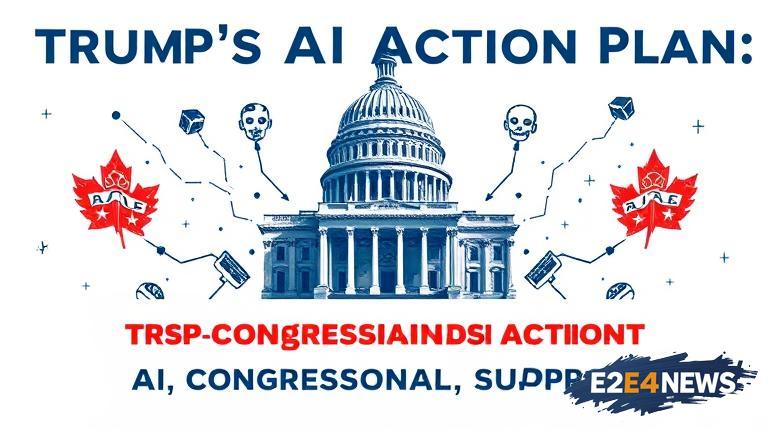The Trump administration has unveiled an ambitious AI action plan, aimed at harnessing the potential of artificial intelligence to drive economic growth, improve healthcare, and enhance national security. However, the success of this plan hinges on the support of Congress, which must provide the necessary funding and legislative framework to bring this vision to life. The plan outlines a comprehensive approach to AI development, including investments in research and development, education and workforce training, and the creation of a national AI strategy. To achieve these goals, the administration is seeking significant funding increases for AI-related research and development, as well as the establishment of new programs and initiatives to support AI adoption and deployment. Despite the promise of AI, there are also concerns about its potential impact on jobs, privacy, and security, which must be addressed through careful planning and regulation. The administration’s plan acknowledges these risks and proposes a range of measures to mitigate them, including the development of new standards and guidelines for AI development and deployment. To ensure the success of this plan, Congress must work closely with the administration to provide the necessary support and oversight. This includes providing funding for AI research and development, as well as passing legislation to address the ethical and regulatory implications of AI. The administration’s plan also emphasizes the importance of international cooperation on AI, recognizing that the development and deployment of AI is a global phenomenon that requires a coordinated response. By working together with other countries, the US can help establish common standards and guidelines for AI development and deployment, while also promoting American leadership in the field. The plan also highlights the need for greater investment in AI education and workforce training, to ensure that American workers have the skills they need to succeed in an AI-driven economy. This includes programs to support the development of AI talent, as well as initiatives to promote AI literacy and awareness among the general public. Furthermore, the administration’s plan recognizes the importance of AI in driving innovation and economic growth, and proposes a range of measures to support the development and deployment of AI in key sectors such as healthcare, finance, and transportation. To achieve these goals, the administration is seeking to establish new partnerships between government, industry, and academia, to support the development and deployment of AI solutions. The plan also emphasizes the need for greater transparency and accountability in AI development and deployment, recognizing that the public must have trust in the systems that are being developed. By providing a clear and comprehensive framework for AI development and deployment, the administration’s plan aims to promote public confidence in AI, while also driving innovation and economic growth. Overall, the Trump administration’s AI action plan represents a significant step forward in the development and deployment of AI, and provides a clear roadmap for the future of AI in the US. However, its success will depend on the support of Congress, which must work closely with the administration to provide the necessary funding and legislative framework. With the right support, the US can maintain its leadership in AI, drive innovation and economic growth, and ensure that the benefits of AI are shared by all. The administration’s plan is a call to action for Congress, and it is imperative that lawmakers respond with the necessary support to bring this vision to life. The future of AI in the US depends on it, and the consequences of inaction could be severe. By working together, the administration and Congress can ensure that the US remains a leader in AI, and that the benefits of this technology are shared by all. The plan is a significant step forward, but it is only the beginning. The real work is just starting, and it will require a sustained effort from both the administration and Congress to bring this vision to life. The stakes are high, but the potential rewards are significant. With the right support, the US can unlock the full potential of AI, drive innovation and economic growth, and ensure a bright future for generations to come.





